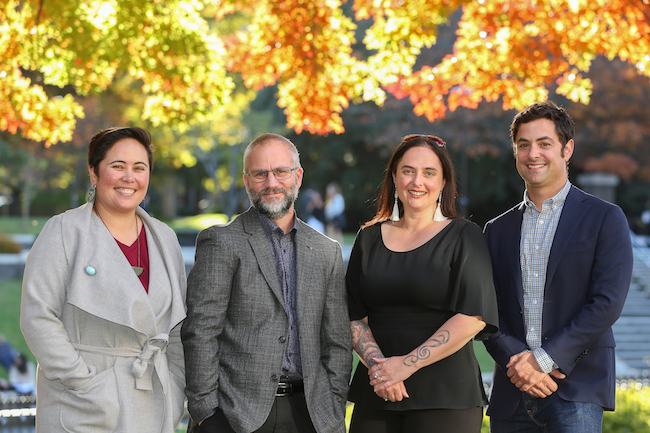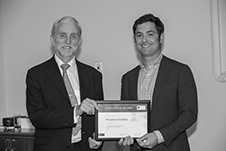Thursday 2 May 2019 4:55pm

Teaching Excellence Award recipients, from left, Dr Anne-Marie Jackson (Physical Education), Dr David McMorran (Chemistry), Nicola Beatson (Accountancy and Finance) and Associate Professor Ben Schonthal (Religion).
Religion Associate Professor Ben Schonthal says receiving a University of Otago Teaching Excellence Award reinforces the value of thinking about the “long-term impact of each class”.
The award panel said Dr Schonthal inspired students “to think critically, communicate clearly and approach their worlds with empathy, enthusiasm, curiosity and compassion.”
Dr Schonthal, who is also Division of Humanities Associate Dean (International), says his teaching is guided by a desire to impart more than key facts.
“Yes, I want students to learn certain details of Buddhist doctrine or key legal concepts, but I’m more concerned with what students will take with them five or 25 years from now, when they’ve forgotten the details. I am always thinking about the long-term impact of my classes.

Dr Schonthal accepts his award from Deputy Vice-Chancellor (Academic) Professor Vernon Squire
“I hope students will come away from my classes feeling confident that they can approach big, messy human problems – from religious conflict to social inequality – and ask the right questions, find the right data and communicate the results in a way that’s clear, compelling and self-aware.”
Dr Schonthal says his teaching abilities have been enhanced by inspirational faculty members and helpful resources available to Otago staff.
“A good example is the Teaching and Learning Circles, introduced by the Division of Humanities in 2018, in which three or four lecturers would attend each other’s classes and then meet afterward to offer suggestions – these informal yet focussed ‘peer review’ processes have been particularly helpful.”
He says that occasional comments from students indicating a class inspired them, helped them to see things in a new way, “or empowered them to express themselves” are the most meaningful feedback.
His interest in teaching practises saw him co-found the HEDC workshop series on pooling teaching tips with Kerry Shepherd in 2014.
The goal of the workshops is to provide a forum for teachers across the University to ‘pool' experiences, help solve problems and share good ideas.
Dr Schonthal’s main area of teaching and research focusses on the ways that religion, law and politics influence and shape each other in the modern world, especially in South and Southeast Asia.
“Since coming to Otago I’ve taught classes that address several different aspects of this, from classes that introduce students to the history, teachings and contemporary practice of Buddhism to upper-level classes that examine how religion works to shape human identity or how modern laws regulate and influence religious communities.”
He also teaches a Master of Arts class on ‘Key Debates in the Humanities’.
“As academics, we get lots of feedback on our research at conferences and in publications, but we don’t always get the same feedback with teaching. I love research, but I tend to think that, in the grand sweep of time, the more lasting and impactful part of my job is the teaching. It’s also one of the most enjoyable parts. As a teacher, I get to share and debate new ideas with a group of people who are (most of the time) open-minded and engaged, with diverse backgrounds and experiences. It’s an awesome job, and I’m really fortunate to be able to do it. That’s never lost on me. Because I love it, I spend a good portion of my time thinking about and planning for teaching – so this award means so much.”
Dr Schonthal has previously won several awards for his teaching and supervision at the University of Chicago and at Otago, including being named one of the "top ten teachers" and finalist for "supervisor of the year" by the Otago University Students’ Association, and receiving the Division of Humanities' Teaching Excellence Award.
In 2016 he received the Otago University Award for Distinction in Research (Early Career). His current research project, supported by the Marsden Fund of the Royal Society of New Zealand, examines the politics and practice of Buddhist law in contemporary South and Southeast Asia.